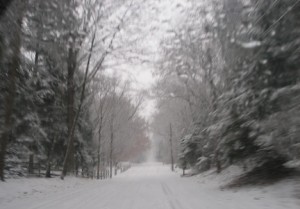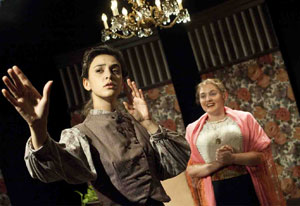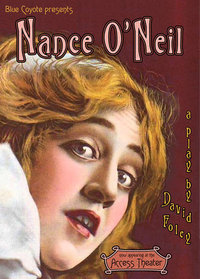I woke early this morning. (I’m still on Lebanese time.) It was dark, the shades were half-drawn, and I have the New Yorker’s habit of not looking out the window anyway. So it wasn’t till I’d puttered around for half an hour—bathroom, email, coffee and oatmeal on the stove—that the morning had lightened enough for me to notice that the steps of my fire escape and the branches of the tree outside my window were humped with snow. “It snowed,” I thought, and, so hard is it to get my attention sometimes, it was another little while before I noticed that it was still snowing.
Now—breakfast over, news read, bed made—I’m sitting at my desk with the goal of “getting some writing done” (this is my usual vague way of putting it) and a light fine snow is powdering the air. The sky is pale pale grey and everything’s quiet, weirdly quiet. Usually there’s some noise from the courtyard or the building or the traffic over on Avenue A.
I have no need to leave the apartment today if I don’t want to. There’s food in the fridge, I’ve made no plans, and I’ve got plenty to do at home. I can stay inside and watch the snow come down.
This is my most essential experience of snow, an experience that takes me directly back to childhood, adolescence, lying on the sofa in our living room, reading a book, with the snow coming down outside. It’s an experience of safety, comfort, longing. Even then, that last word was part of it. Why longing?
Burned away from this experience is excitement. Snow always meant excitement when I was young. There was the exciting possibility that school would be canceled, all of us watching the list of closed schools scroll down the TV screen. (Hamilton-Wenham! Yay!)
There was the excitement of the snow itself. Even now my contentment watching the snow is at war with an impulse to put on some boots and get out in it. Our house was on a little hill, and our basement was full of Flexible Flyers and plastic sleds and skis and even a toboggan, none of it in very good repair. Boots were haphazardly lined up in the basement, and there was an old bureau whose top drawer was full of gloves and hats and scarves. It was often difficult to find a matching pair of gloves, and at times you’d have to go out wearing two left or two right ones. I remember a period when everyone wore stocking caps, long knit caps whose points fell halfway down your back and ended in a pompom, so that for a time everyone in our small Massachusetts town looked like Hans Brinker.
There were quarrels over the sleds, fights and hurt feelings and wounded senses of proprietorship. But there was fun, too. The trudge up the hill, the swift slick ride down that had to be navigated so that it ended somewhere between the woods on the left and the driveway on the right. More daringly, you could go down the other side of the hill, into the woods behind the house, a bumpier steeper ride through staggered trees. If the snow was firm, the Flexible Flyers were the best. Their metal runners shot over the snow with a speed you could steer but not abate—rush and power!—with the rope looped through the holes on either side of the movable handlebars.
The toboggan our parents gave us one Christmas. They took a picture of all seven of us sitting on it, one behind the other, in front of the Christmas tree. One afternoon I was riding in front, eyes squeezed shut against the snow that sprayed up over the curved wooden slats, and somehow we steered it wrong. (You steered it by leaning right or left. “Lean! Lean!”) The toboggan careened down into the woods on the left. My brothers, seeing the danger, jumped off. I, seeing nothing, smashed into a tree. I wailed my way into the kitchen, where my mother screamed at the sight of my bloody face. She drove me downtown to my father’s dental office. He put me in the chair and closed the wound in my forehead with a single suture.
It’s hard to describe all this—injuries and all—without making it sound idyllic, and perhaps it was. Red cheeks, numb toes, hot cocoa with a melting marshmallow bobbing on the surface. The snow falling down outside the kitchen windows.
I understand logically but not emotionally why some people hate snow. And, like most people with a strong emotional attachment to something, I resent people who respond to my attachment with logic.
Snow is useless, worse than useless. Last year I flew out of New York a couple of days after the Christmas blizzard that crippled the city, with the result that I waited six hours in line at the airport and my luggage went missing for a month. I hated the snow. But that’s inaccurate. I hated only what the snow had done. The snow itself I still loved.
You could argue that I love snow because I grew up with it, because of all I’ve described above. But I’m not sure that’s true. Last Saturday I was in Istanbul. It was cold and rainy and we stopped in the old Spice Market to buy a scarf. The salesman lamented the cold, wet weather but, on the bright side, said that it might snow later. He didn’t like the rain, but he liked the snow, though it snows very seldom in Istanbul. Later it did snow. By that time we’d been walking around in the rain for a few hours, and none of us had the shoes for it, and the wet, clumpy flakes that fell without sticking didn’t seem like much of an improvement. But even so at times—as, for instance, when we were leaving the Grand Bazaar and saw the drifting flakes framed by one of its 15th-century arches—there were little shivers of beauty.
John Berger says that “beauty is always an exception, always in despite of. This is why it moves us.” He means that beauty exists “in despite of” its “bleak natural context”—a context of “energy and struggle.” I remember the news reports during the Blizzard of ’78. Cars got stranded on the highway, and a few drivers kept their engines running and their heaters on and died from the carbon monoxide fumes. And I went out the morning of the blizzard and walked hip deep through snow, not without a little fear that I would fall into a bank and freeze to death.
Because the beauty is not just what gets framed by an apartment window or an archway of the Grand Bazaar. Part of the beauty is the longing. People freeze to death in blizzards, drown in oceans, get fatally lost in forests. The night sky is cold and empty. But they afflict us—or me anyway—with a longing to be somehow out in them, part of them. “The woods are lovely, dark and deep.” What longing there’s always been in those words.
I wonder if we have to add a “because of” to Berger’s “in despite of.” Is it the “energy and struggle” that calls us outward? Or is it (Berger again) because nature “is what exists without any promises”? Is there a yearning to be a part of that pure existence? “Oh, let me not exist!” Rumi, the Sufi poet, is supposed to have said. Frost’s poem is sometimes said to be about death, but that’s never seemed entirely accurate to me. There are other ways to dissolve besides death, and those moments—those moments of beauty and longing, stopped in front of those snowy woods—seem to promise a little dissolution of the boundaries of self. A return. “We live…after the Fall,” says Berger. But fall from what? Eden—that myth of creation, of making—doesn’t seem to capture it. Existence is what doesn’t need to be created, and it may be existence itself that we long to return to.






